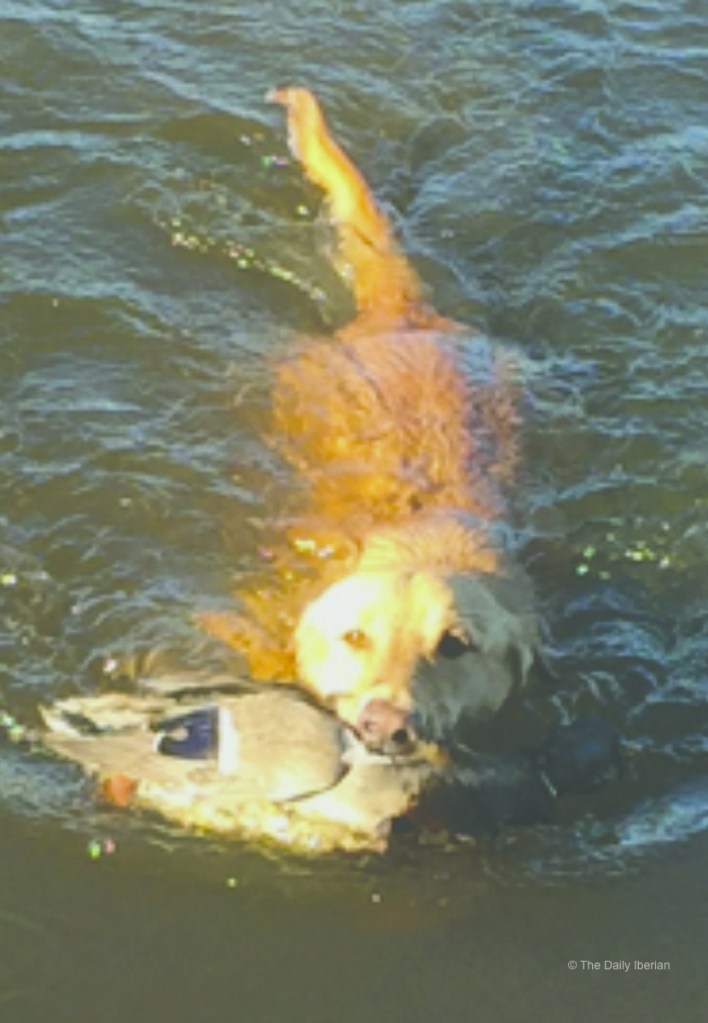Keep ’em fit: During the split, exercise retrievers, don’t overfeed
Published 6:00 am Sunday, December 3, 2017

- Meg, Jed Broussard’s yellow Labrador retriever, swims back to the duck blind recently with a mallard drake. Broussard has had Meg, 4, since she was 6 weeks old.
Waterfowl hunters and their trusty Labrador retrievers might be a little down after sunset today, the last day of the first split of duck hunting in the Coastal Zone, West Zone and East Zone.
For sure, they’ll be idle during the nearly two-week break before the second and last split opens Dec. 16. What outdoorsmen do during the down time is up to them but it’s a critical time for their friend and companion that goes after the ducks and geese they shoot.
A veteran veterinarian from New Iberia and an accomplished professional dog trainer from Delcambre agreed this past week that it is important to keep the dogs in shape between the splits. Exercise them and don’t feed them too much during this off-season.
“You don’t want them like me,” Dr. Roger Boughton, a local veterinarian and avid deer hunter and duck hunter, said with a chuckle Friday afternoon as he rode with Ricky Gravois of Jeanerette toward the Wax Lake area, where he planned to hunt deer this weekend. “You want ’em lean and mean. You want an athlete. Know what I mean?”
Jed Broussard, who has been training retrievers since the early 2000s, echoed that “lean and mean” sentiment. The Delcambre outdoorsman was at his camp Friday afternoon in Pecan Island waiting to go duck hunting on his lease in Cameron Parish just north of the Rockefeller Wildlife Refuge, where he has enjoyed an above average season to date.
Broussard, 54, recommended a swim every other day for retrievers.
“If you could, I’d swim ’em. Swimming’s the best thing you can do to keep them in shape,” he said, warming up to the subject on the first day of December.
“I’d take them every other day, about three or four 100-yard swims. They’ll be right on track where they need to be” when opening day of the second split rolls around, he said.
The 77-year-old Boughton, who killed a nice 6-point buck two weekends ago north of Mangham, where he grew up and played on a high school state championship football team, said keeping retrievers fit and trim is important. He hunts with Kate, a 5-year-old black female Labrador retriever champion he got when she was 7 months old.
“Well, here’s the deal. They’re already in shape, you need to keep them in shape,” Boughton said, noting he usually sends Kate to a trainer when the first split ends. They have been on four duck hunts this season, he said, noting usually they average 16 to 20 outings a season.
Kate’s trainers include Broussard, Marcus Hebert of Loreauville and Brian Broussard of Jackson, Mississippi, formerly of Morgan City.
It’s a good time to work on “doubles” with dummies, to do “yard work” at distances of about 150 yards, said Boughton, owner of Iberia Animal Clinic.
“That’s the time, really, to do it, when they’re not out in the woods or in the blind,” he said.
There are other considerations before duck hunting starts up again, he said.
“The best thing to do is keep them in shape, keep them fit and keep them on heartworm medicine,” he said. “The best thing we’ve got going right now is a six-month shot called Proheart 6 (moxidectin).”
Also, Boughton said, “Keep the yearly(s) up to date.” For example, he said, make sure the retriever has its distemper, rabies, hepatitis, lepto (leptospirosis), corona (canine coronavirus) and parvo (canine parvovirus) vaccinations.
Diet is vitally important, Boughton and Broussard said.
Broussard, manager of technical support for Atmos Energy, the nation’s largest natural gas distributor, said three to four cups of food a day is sufficient for a retriever. Contrary to what some retriever owners around here might believe, there is no reason to feed the dogs a lot to, perhaps, keep the fat on during the winter, as they say.
“We don’t have a winter. This is South Louisiana,” Broussard said.
It’d be a different story, he said with a chuckle, if they lived in Canada.
This time between splits also is an opportunity to tend to any wounds a retriever might have suffered during the first split, Boughton said.
“Any problem they had during the season, you need to heal that up during the split — like a pulled pad, or a cut pad, or a wound from a fight with a nutria or ’coon, any kind of cut from briars,” the veterinarian said.
Otherwise, both outdoorsmen suggested, keep them happy and healthy going into the next split of duck hunting. Boughton said he is hopeful the second split is better than the first split.
If there are more ducks, Kate should have a great time, he said. Ditto for the veterinarian.





